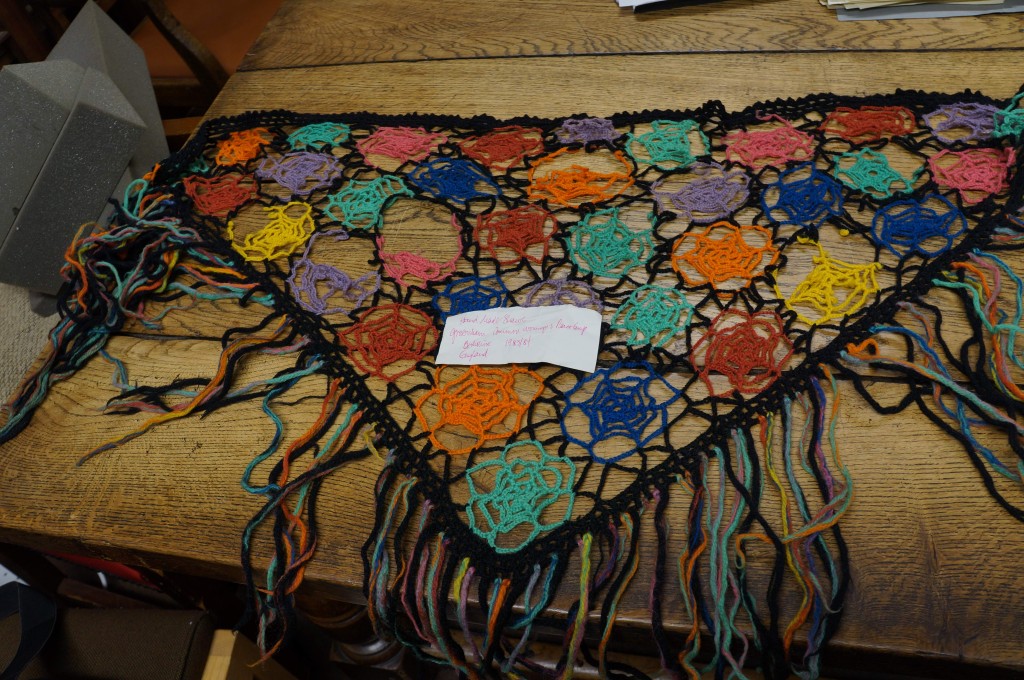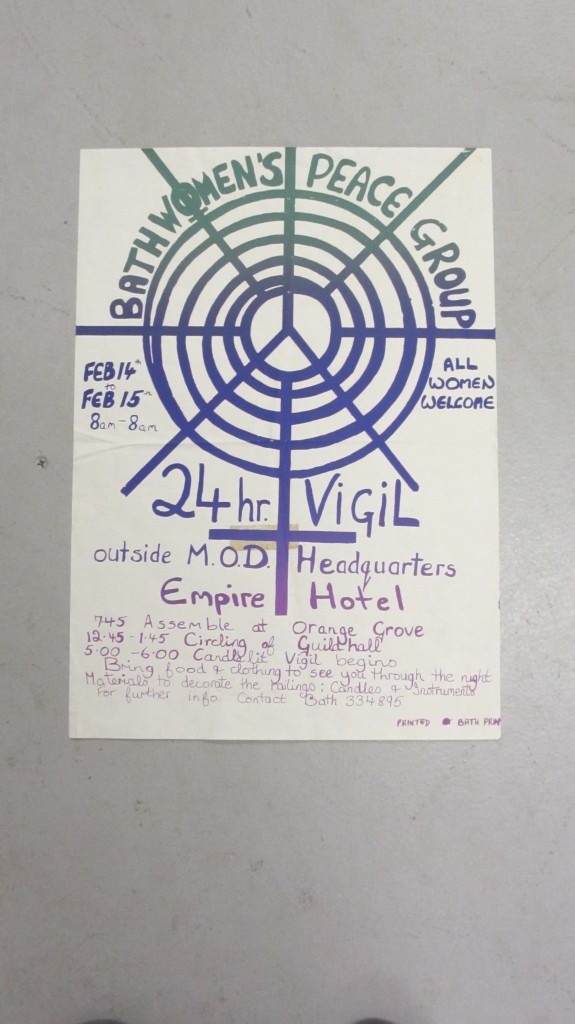We asked Alison Bartlett, currently a visiting scholar at the University of Bristol from the University of Western Australia, to write about her experiences researching in the FAS.
In the spirit of Greenham activism, she ‘widened the (feminist archive) web’ to collections relating to the feminist peace movement in Australia.
Enjoy!
***
As an Australian researcher interested in feminist cultural histories, the Feminist Archives South is one of the main reasons I applied for a Benjamin Meaker Visiting Professor position at Bristol University. My research into the 1980s women’s peace movement and especially the two women’s peace camps held in Australia has always been in relation to Greenham Common women’s peace camp. The opportunity to sift through the rich archives of this iconic feminist event is a rare treat.
At the same time, I’ve been reading Kate Eichhorn’s book The Archival Turn in Feminism: Outrage in Order (2013) which proposes that the growing interest by feminists to delve into archives is to make sense of the ‘legacies, epistemes, and traumas pressing down on the present’. Eichhorn argues that neoliberalism of the late twentieth century has not only individualized our capacities as subjects but eroded our sense of collective agency, something that archives like the Feminist Archive South restores. Rather than understanding archives as nostalgia for the past, she claims archives reorient our understanding of the past and therefore enable us to reimagine our present.
The boxes of material on Greenham Common are full of letters, flyers, newspaper clippings, court documents, photographs, stickers, postcards, and even a multicoloured spiderweb shawl and a piece of the green military fence tied with webs of string. I read with astonishment that some Greenham women took US President Ronald Reagan to court in New York over the deployment of nuclear missiles onto English common land. And the letters sent to women arrested and sent to Holloways prison are particularly poignant.
The ferocity of their belief in the necessity to stop escalating military interventions and nuclear arms is inspiring, and it’s easy to see how it motivated a worldwide movement of women protesting war and militarization. Together with the women’s movement, the women’s peace movement formed a significant set of arguments about the continuum of male violence, and women’s agency to imagine other ways of living, loving, and doing civilian politics.
My research into the 1980s women’s peace camps in Australia indicates that they were a direct response to what was happening in Berkshire. They were conceived as support actions but also to bring attention to the particularities of the US military in Australia. The first camp was held in central Australia outside the US military base at Pine Gap in December 1983, coinciding with the day the Cruise Missiles arrived at Greenham. The second camp was held a year later in 1984 at Cockburn Sound on the west coast near Fremantle, a major port into which US naval vessels docked and sailors took their rest and recreation.
Unlike at Greenham Common, an umbrella organization was formed specifically to coordinate the peace camps in Australia, bringing together a coalition of women’s organisations, peace, and anti-nuclear groups. The archives are largely filed under the name of the group: Women For Survival. There are substantial collections at the Jessie Street National Women’s Library in Sydney, and the University of Melbourne Archives in Melbourne which holds the Victorian Women’s Liberation and Lesbian Feminist Archives. But almost every State Library and many university libraries around Australia also hold some material. The Murdoch University Special Collections in Perth holds material in the Gay and Lesbian Archives of Western Australia (GALAWA) collection; and in Adelaide the State Library of South Australia now holds some of the dispersed resources from the Adelaide Women’s Liberation Archive; the State Library of Victoria in Melbourne; and the Fryer Library at the University of Queensland in Brisbane hold material. There are some badges displayed at the Museum of Australian Democracy in Canberra where you can also hear questions in Parliament being played on rotation, and there’s a student film made at the Pine Gap camp available at the National Film, Television and Radio School online. The Northern Territory Archives Service in Alice Springs has a great collection of oral history interviews.
There was a traffic of ideas, people, rituals, telegrams, letters, songs, and even parts of the military mesh fences between Greenham and the Australian peace camps. There are traces of this in the Australian archives and in the Feminist Archives South. Zohl de Ishtar stands out as a regular writer for the Greenham Newsletter, campaigning relentlessly to raise the profile of colonized and militarized Pacific nations, especially those used as nuclear testing sites from the 1950s. But it’s the thousands and thousands of women who went to Greenham for a day or a week or a year who register the impact of collective action, and whose traces in the archives demonstrate the mass attraction of arguments for de-militarisation amidst the threat of nuclear war during the Cold War period. I can’t imagine how 30 000 turned up on December 12, 1982 to hold hands around the entire 9 mile perimeter of the US Air Base at Greenham to ‘embrace the base’.
Eichhorn argues that archives themselves are forms of activism, as are archivists. The Feminist Archives South certainly demonstrate the value of feminist archives, and remind us of the possibilities for changing our worlds through collective action.
***
We welcome all our readers to write about their experiences researching in the Feminist Archive South. It helps us to understand how people engage with our collections, and communicate our holdings to wider audiences.
If you have a FAS story you want to share with readers of this blog, please send it to us (no more than 1000 words).
Many thanks to Alison for taking time to write up her visit!


